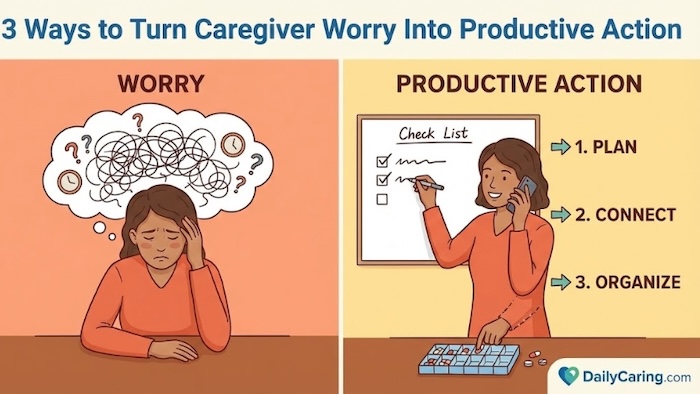We all know how challenging and stressful caregiving can be. That’s why it’s helpful to have plenty of self-care options in mind. All Home Care Matters shares eight practical caregiver self-care tips to help you support your own well-being.

Caregiving for loved ones is both challenging and rewarding.
As a caregiver, you play a critical role in the lives of those you care for, providing essential support and companionship. However, caregiving responsibilities can be overwhelming, leading to physical and mental exhaustion.
To maintain physical and mental health and support your well-being, it’s essential to take good care of yourself.
Finding time each day to do something positive for your body and mind gives you a break from your daily duties and can significantly impact your health and quality of life over time.
Here, we explain the importance of self-care for caregivers and share eight practical strategies to support their well-being.
Self-Care Helps Caregivers Prevent Burnout
Simply put, caregiving can take a toll on your physical and mental health.
The constant demands of caregiving, coupled with emotional and psychological stress, can lead to burnout, depression, and a host of other health problems.
Studies have shown that caregivers are at higher risk of developing chronic illnesses such as heart disease, diabetes, and hypertension. On top of this, they are also more likely to experience anxiety and depression than non-caregivers.
According to a 2022 Cleveland Clinic survey, people who infrequently or never engage in activities that promote their mental well-being identified two primary barriers: being too busy (34%) and caregiving for a loved one (36%).
Unsurprisingly, caregivers often fall into both categories.
For some, caregiving can be so physically and emotionally demanding that it leads to burnout, a state of emotional, mental, and physical exhaustion caused by prolonged stress and exertion.
Caregiver burnout can reduce the quality of care provided due to declines in the caregiver's physical and mental well-being.
However, caregivers who practice self-care are more likely to provide better care to their loved ones and to have a higher quality of life.
8 Practical Caregiver Self-Care Tips
Proper self-care can take many forms. Having a variety of suggestions allows each person to choose the practices that work best for them.
1. Set aside time each day for self-care
Setting aside even a few minutes each day for self-care can significantly improve a caregiver’s quality of life.
This could include exercise, meditation, reading, or any other activity that promotes genuine relaxation.
2. Get enough sleep
Sleep is a critical time when the body and mind can recover from the daily strains of caregiving.
Getting 7 to 8 hours of sleep each night is ideal, but not always possible. If getting enough sleep at night is challenging, consider supplementing with brief naps during the day.
If you struggle to fall asleep or stay asleep, try incorporating relaxation techniques such as meditation, deep breathing, or a warm bath before bedtime.
3. Exercise regularly
Exercise is essential for maintaining physical and mental health. Try to get 10 – 30 minutes of exercise each day.
This can include activities such as walking, jogging, or yoga.
4. Maintain a healthy diet
A healthy diet is essential for both mental and physical well-being. Aim for a balanced diet with plenty of fruits, vegetables, whole grains, and lean protein.
When possible, avoid processed foods, sugar, and caffeine, since these can hurt gut health, which is linked to mental health.
5. Stay connected with loved ones
Caregiving can often be an isolating experience, but staying connected with friends and family can help alleviate some of the loneliness that comes with it.
Make time to talk with friends and family regularly, even if it is just a quick phone call. Human connection is shown to increase overall happiness and quality of life.
6. Seek external support often
Having a support system helps you manage the challenges of day-to-day life.
Don’t be afraid to seek support, especially when caring for a loved one alone. This could include support from friends, family, caregiver support groups, or counseling.
7. Take regular breaks
To prevent burnout, regular breaks are essential.
Find ways to get time away from caregiving, like adult day programs, hiring a part-time caregiver, respite care, or having a family member help out.
These breaks are also the perfect opportunity to practice self-care.
8. Practice mindfulness
Finally, mindfulness is the practice of being present in the moment. This is beneficial for all people, but especially for caregivers.
Often, you might find yourself worrying about the future of your loved one. By staying present, you can continue to provide the best possible care and reduce unnecessary anxiety.
Practice mindfulness by taking a few minutes each day to focus on your breath and be present in the moment.
Recommended for you:
- Caring for the Caregiver: 6 Ways to Get Help and Improve Your Health
- 15 Quick Tips for Managing Caregiver Stress
- Don’t Believe 3 Common Myths That Cause Caregiver Guilt
Guest contributor: Lance A. Slatton is a senior case manager at Enriched Life Home Care Services in Livonia, MI. He is also the host of the podcast All Home Care Matters, a must-listen on both the podcast and YouTube. By subscribing to the show, you will gain access to a wealth of information and tips that can help you provide the best possible care for your loved ones.
References:
– Survey: Nearly Half of Americans Prioritize Mental Health with Daily “Mindful Moments”
– Bickley JB. Care for the caregiver: the art of self-care. Seminars in Perioperative Nursing. 1998 Apr;7(2):114-121. PMID: 9801663.
– Oliveira D, Sousa L, Orrell M. Improving health-promoting self-care in family carers of people with dementia: a review of interventions. Clin Interv Aging. 2019 Mar 1;14:515-523. doi: 10.2147/CIA.S190610. PMID: 30880932; PMCID: PMC6402440.
About the Author

Lance A. Slatton CSCM – Known as “The Senior Care Influencer” is a Writer, Author, Influencer, and Healthcare professional with over 20 years in the healthcare industry. He is a senior case manager at Enriched Life Home Care Services in Livonia, MI. Lance A. Slatton is also the host of the award-winning podcast & YouTube channel All Home Care Matters.













